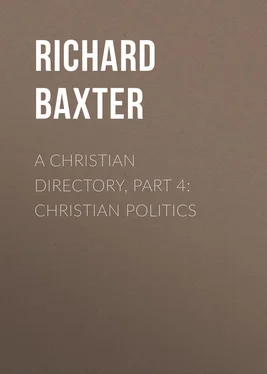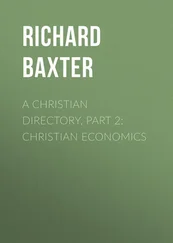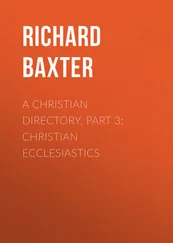Richard Baxter - A Christian Directory, Part 4 - Christian Politics
Здесь есть возможность читать онлайн «Richard Baxter - A Christian Directory, Part 4 - Christian Politics» — ознакомительный отрывок электронной книги совершенно бесплатно, а после прочтения отрывка купить полную версию. В некоторых случаях можно слушать аудио, скачать через торрент в формате fb2 и присутствует краткое содержание. Жанр: foreign_antique, foreign_prose, на английском языке. Описание произведения, (предисловие) а так же отзывы посетителей доступны на портале библиотеки ЛибКат.
- Название:A Christian Directory, Part 4: Christian Politics
- Автор:
- Жанр:
- Год:неизвестен
- ISBN:нет данных
- Рейтинг книги:3 / 5. Голосов: 1
-
Избранное:Добавить в избранное
- Отзывы:
-
Ваша оценка:
- 60
- 1
- 2
- 3
- 4
- 5
A Christian Directory, Part 4: Christian Politics: краткое содержание, описание и аннотация
Предлагаем к чтению аннотацию, описание, краткое содержание или предисловие (зависит от того, что написал сам автор книги «A Christian Directory, Part 4: Christian Politics»). Если вы не нашли необходимую информацию о книге — напишите в комментариях, мы постараемся отыскать её.
A Christian Directory, Part 4: Christian Politics — читать онлайн ознакомительный отрывок
Ниже представлен текст книги, разбитый по страницам. Система сохранения места последней прочитанной страницы, позволяет с удобством читать онлайн бесплатно книгу «A Christian Directory, Part 4: Christian Politics», без необходимости каждый раз заново искать на чём Вы остановились. Поставьте закладку, и сможете в любой момент перейти на страницу, на которой закончили чтение.
Интервал:
Закладка:
7
Psal. cxix. 98; Prov. i. 6-8; xii. 15, 18; xiii. 1, 14, 20; xv. 2, 7, 12, 31; xxii. 17; xxv. 12; Eccl. xii. 11; Dan. xii. 3, 10; Matt. xxiv. 45; Psal. xxxvii 30; Eccl. ii. 13; Isa. xxxiii. 6; Matt. xii. 42; Luke i. 17; xxi. 15; Acts vi. 3; 2 Pet. iii. 15; Mal. ii. 6, 7; 1 Thess. v. 12, 13; Heb. xiii. 7, 17; Tit. i. 9, 13; ii. 1, 8; 2 Tim. iv. 3.
8
Prov. xiv. 29; Col. iii. 8.
9
Matt. ix. 13; xii. 7; Psal. xl. 6; li. 16; 1 Sam. xv. 22.
10
2 Cor. x. 8; xiii. 10; Rom. xv. 2; xiv. 9; 1 Cor. xiv. 26; 2 Cor. xii. 19; Rom. iii. 8.
11
Eph. iv. 12, &c.; 1 Cor. xii.
12
Matt. xxii. 39; v. 43, 44; vii. 12.
13
Jam. iii. 15-18; Gal. ii. 13, 14; Deut. xxv. 16; 1 Cor. vi. 9.
14
Matt. vii. 1, 2; John vii. 24; Rom. xiv. 10, 13; 1 Pet. i. 17.
15
Luke xiv. 26, 33; xii. 4; Prov. xxiii. 23.
16
Matt. xviii. 3; Prov. xxvi. 12, 16; xxviii. xx; 1 Cor. iii. 18; Prov. iii. 7.
17
Judg. viii. 27; 1 Cor. vii. 35; 1 Kings xiv. 16; xv. 26; Deut. xxix. 22; Exod. xii. 26; Josh. iv. 6, 22; xxii. 24, 25.
18
1 Cor. iv. 3, 4; John v. 44; Luke xiv. 26; Gal. ii. 13, 14; Acts xi. 2, 3.
19
Col. iii. 4, 5; Rom. vi. 1, &c.; xiii. 12, 13; viii. 13.
20
Matt. xxiv. 42; xxv. 13; Mark xiii. 37; 1 Thess. v. 6; 1 Pet. iv. 7; 1 Cor. xvi. 15; Matt. vi. 13; xxvi. 41.
21
Eccl. vii. 2-6; 2 Cor. iv. 16; v. 1, 7, 8; Luke xii. 17-20; xvi. 20, &c.; Matt. xxv. 3-8; Acts vii. 56, 60.
22
Among the Jews it was all one to be a lawyer and a divine; but not to be a lawyer and a priest.
23
Finis ad quem rex principaliter intendere debet in seipso et in subditis, est æterna beatitudo, quæ in visione Dei consistit. Et quia ista visio est perfectissimum bonum maxime movere debet regem et quemecunque dominum, ut hunc finem subditi consequantur. Lib. de Regim. Principum Thomæ adscript. Grot. de Imper. Sum. Pot. p. 9. Even Aristotle could say, Polit. vii. c. 1, 2. et eadem fine, that each man's active and contemplative life, is the end of government, and not only the public peace; and that is the best life which conduceth most to our consideration of God, and that is the worst, which calleth us off from considering and worshipping him. Vide Grot. de Imper. sum. Pot. p. 10. Quam multa injuste fieri possunt, quæ nemo possit reprehendere. Cicero de fin. Read Plutarch's Precepts of Policy, and that old men should be rulers.
24
Read often Psal. ii. and ci.
25
Read Bilson of Subject. p. 129. to the end of the second part, specially p. 140-142. The laws of Charles the Great. And Grotius de Imperio Sum. Pot. circa Sacra. c. 1. et per totum.
26
Jul. Capitolin. saith of the Antonines, That they would not be saluted by filthy persons. And Lampridus of Alexander Severus, that, Nisi honestos et bonæ famæ homines ad salutationem non admisit. Jussitque ut nemo ingrediatur, nisi qui se innocentem novit: per præconem edixit, ut nemo salutaret principem qui se furem esse nosset, ne aliquando detectus capitali supplicio subderetur. Read Sebastian. Foxius de Regno Regisque institutione. Even Crœsus, Dionysius, and Julian were liberal to philosophers, and ambitious of their converse. Vera civitatis fœlicitas est, ut Dei sit amans et amata Deo; illum sibi regem, se illius populum agnoscat. August. de Civit. Dei, 1. v. c. 14.
27
Aug. Ep. Bonifac. Omnes reges qui populo Dei non prohibuerunt nec everterunt quæ contra Dei præcepta fuerunt instituta, culpantur. Qui prohibuerunt et everterunt, super aliorum merita, laudantur.
28
When Hunnerichus the Arian Vandal king, was resolved to banish, imprison, and otherwise persecute the orthodox bishops and pastors, he first trieth them by threatenings and divers cruelties, and after appointeth a public disputation; where his bishops and officers, having no better pretence, cruelly beat the people and pastors, and then falsely tell the king, That by tumult and clamour they avoided disputing. And at last he calleth together all the pastors that were met for the disputation, and, to insnare them, putteth an oath upon them, That after the king's death, they would take his son for their king; and that they would send no letters beyond sea. This oath divided the orthodox among themselves. For one part of the bishops and pastors said, If we refuse a lawful oath, our people will say that we forsake them, and the dissolution of the churches will be imputed to us. The other part perceiving the snare, were fain to pretend Christ's command, "Swear not at all." The king having separated them, and the officers took all their names, sendeth them all to prison. To those that took the oath, they said, Because that contrary to the command of the gospel, you would swear, you shall see your cities and churches no more, but be sent into the country to till the ground; but so that you presume not to sing psalms, or pray, or carry a book, or baptize, or ordain, or absolve. To those that refused the oath, they said, Because you desired not the reign of the king's son, and therefore refused the oath; you shall be banished to the isle of Corsica, to cut wood for the ships. Victor. Utic. p. (mihi) 456, 457. Generalis Jesuitarum ex nimio absoluti imperii amore, delaturas in scrinia sua admittit, iisque credit, non audito eo qui accusatur: quod injustitiæ genus ab ethnicis ipsis improbatur. Imperando non bonis regibus se facit similem, qui senatum magni fecerunt; sed tyrannos mavult imitari, e. g. Tarquinium superbum, qui ante omnia conatus est debilitare senatus numerum et authoritatem, ut omnia suo libitu facere posset; similiter generalis cum assistentibus suis odit synodos generales, omniaque experitur, ne tales instituantur conventus, quibus rerum gestarum reddere rationem necesse habeat. – Generalis Jesuiticus in eligendis officialibus non curat quod sit cujusque talentum aut dotes eminentiores, sed quam bene secum aut cum provinciali suo conformetur. Quæ causa est cur homines viles et abjecti animi officiis præponantur, qui a superioribus duci se sinant ut nervis alienis mobile lignum. Mariana de Reform. Jesuit. cap. 13, 15, 16, 18. In Arcan. Jesuit. p. 131, 132. Recit. in Apolog. Giraldi. Nulla est latronum societas in qua justicia non plus loci habeat, quam in societate nostra, &c. – ubi non modo scientia et ignorantia in æquo sunt, sed etiam scientia impedimento est, quo minus quis consequatur præmia humano ac divino jure debita. Marian. Aphor. 84. c. 12, &c. 14. 89. Aphor. 87, &c. The rest is worth the reading, as a warning from a Jesuit to the governors of state and church. Aphor. 80. c. 11. Superiores societatis nostræ sunt homines indigni, qui officiis præsint, cum generalis metuat ac sublatos velit, quorum eminentes sunt virtutes. Boni quam mali ei suspectiores sunt. This, and abundance more, saith Mariana, a Jesuit of ninety-six years of age, learned in Hebrew, Chaldee, Syriac, Greek, and Latin, of his own society.
29
Lamprid. numbers it with Alexander Mam. Severus's good works. Judæis privilegia reservavit; christianos esse passus est. Nam illo tempore crudelius Arianorum episcopi, presbyteri, clerici, quam rex et Vandali sæviebant. Id. p. 468.
30
Justitiæ munus primum est, ut ne cui quis noceat nisi lacessitus injuria. Cicero. Prov. xxii. 7; xxviii. 16; Psal. cxix. 23; Prov. xxv. 2. Leg. Epist. M. Ciceronis ad fratrem.
Читать дальшеИнтервал:
Закладка:
Похожие книги на «A Christian Directory, Part 4: Christian Politics»
Представляем Вашему вниманию похожие книги на «A Christian Directory, Part 4: Christian Politics» списком для выбора. Мы отобрали схожую по названию и смыслу литературу в надежде предоставить читателям больше вариантов отыскать новые, интересные, ещё непрочитанные произведения.
Обсуждение, отзывы о книге «A Christian Directory, Part 4: Christian Politics» и просто собственные мнения читателей. Оставьте ваши комментарии, напишите, что Вы думаете о произведении, его смысле или главных героях. Укажите что конкретно понравилось, а что нет, и почему Вы так считаете.












